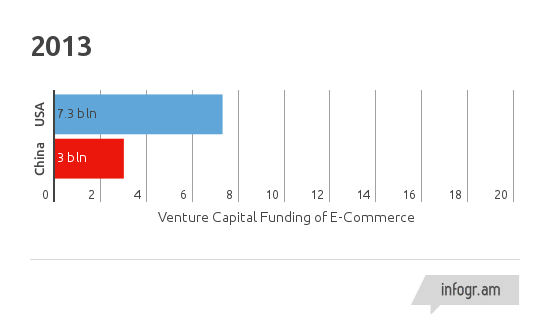China is Still Underrated. Venture Capital Funding of E-Commerce in China is 25% Higher than in the U.S.
In
Login if you are already registered
(no votes) |
(0 votes) |
Day Figure
Author: Andrey Kortunov, Director General of the Russian International Affairs Council.
It is believed that China’s success in the IT sector is primarily due to the capacity of the domestic market, the cheap workforce and many years of successful (if not always legal) copying state-of-the-art western technology.
The argument goes that government restrictions on the distribution of online information and the country’s authoritarian regime have an overall restraining effect on the development of IT innovation; therefore, China is fundamentally incapable of creating its own Silicon Valley, despite its success in taking over global consumer electronics markets with such brands as Lenovo, Huawei and Xiaomi.
However, statistics on many of the most advanced IT segments dispel this myth.
For example, back in 2013, venture capital financing of Chinese E-Commerce accounted for around 40 per cent of that in the United States ($3 billion vs. $7.3 billion), whereas in 2015, financing in China was already 25 per cent higher ($20.3 billion vs. $16.3 billion).
Major Chinese E-Commerce Companies (Baidu, Alibaba and Tencent) have not been perceived as clones of westerner companies for some time now, and although they currently cater mostly for the domestic market, each has global expansion plans. Given their fast growth, it would seem that production cooperation in the IT sector is one of the “underrated assets” of the engagement between Russia and China.

Data
— PwC
(no votes) |
(0 votes) |




